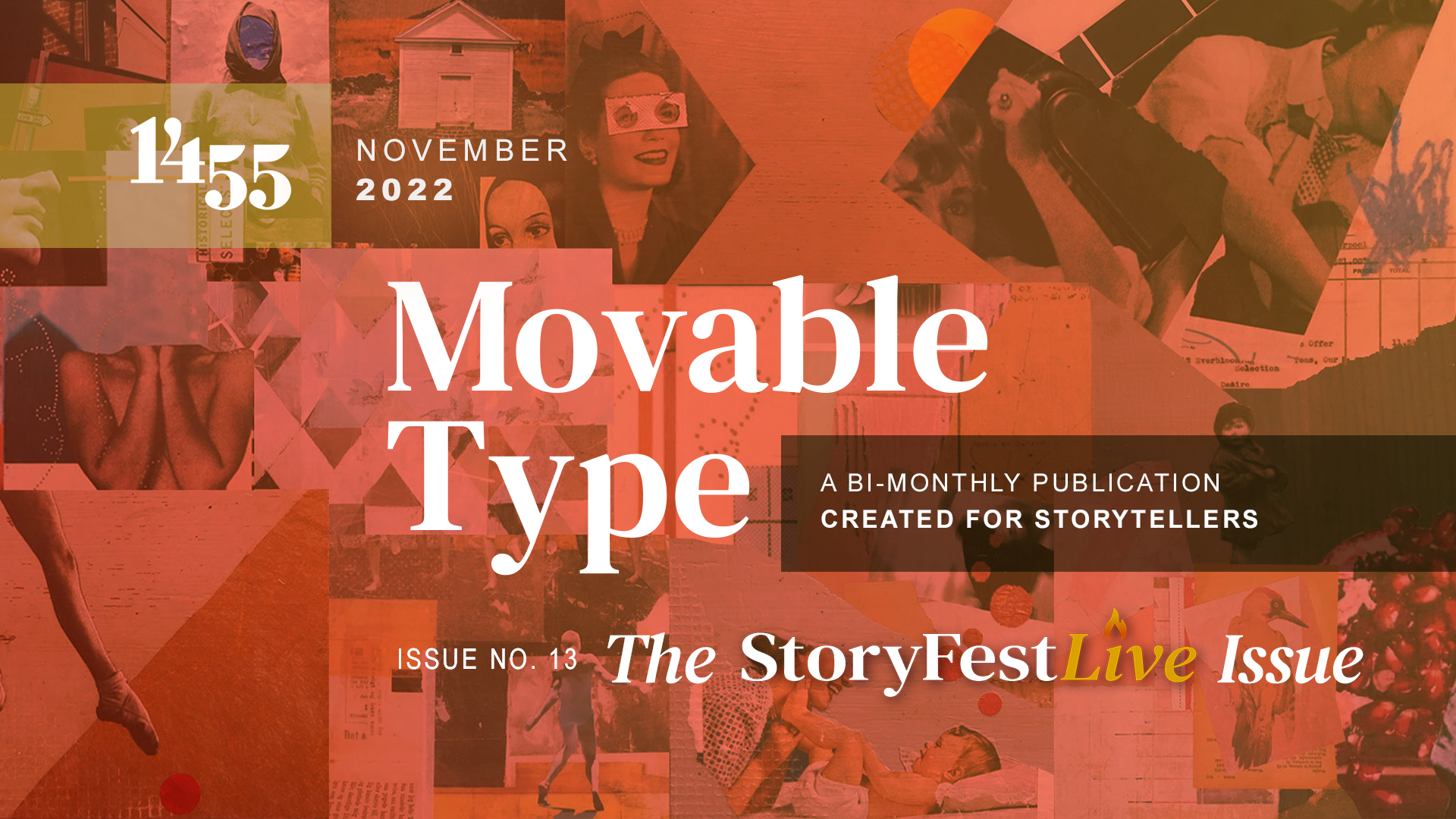Kurt Mullen
Why I Tell Stories
I have a memory of an old tennis coach who drove a rusty Camaro in the 70s and who had a toy poodle called Cocoa. I’ve been thinking about it a lot lately, this memory, this man.
His name was Mike. What’s great about remembering him all these years later is that Mike memories are magnets for other kinds of memories: The more I think about him, the more details of the old days I see.
This Mike, he must be important. To me. Why else would his memories be hanging around the old brain pan after all this time? What if I look a little more closely? What if I find something? What if I spend some time really thinking about this guy?
What if there’s a good story?
I tell stories because some of these details have meanings attached to them, and I’m only going to find out the meanings if I try. And that’s me, telling stories: That’s me, age 50: I’m trying.
There are all kinds of people out there, trying like this. There are all kinds of people out there telling stories all the time, telling stories right now.
And I’m one of them.
And though the memory is of Mike, the way he used to bounce out of his Camaro, a racquet under one arm, and Cocoa under the other, I know the resultant story will be about me. I am the protagonist of all my stories. I’m that kind of storyteller: I don’t invent so much as I try to understand.
What did I just do with my life?
It’s almost like I’m talking about the remote control, or the car keys.
Where are they?
Where was I?
Exactly.
I’m not quite sure, to tell you the truth.
That’s why I’m telling stories.
To understand some of the things I’ve done. To understand that there has been meaning.
The first story I ever told on a stage – less than four years ago, in a comedy club in Boston – was about my late mother. It was about a note she left me, with instructions to read after she dies. The story went okay. For a first-time storyteller, maybe it went great. But you know what? I can tell it again.
And I can keep telling it, until I know it’s great.
That’s why I tell stories.
I think about the way she and I were in our old town, Burlington, Massachusetts. That’s where we knew Mike, the tennis coach.
Burlington was more of a hockey town than any kind of tennis-playing country club town. I liked it for that. Or I like it for that now. In any case, out my back window back then, I could see these three tennis courts. When the weather was warm I spent all my time on them, practicing and playing. I was a really hard-working kid. The best part of my game was how badly I wanted to get to each ball. That’s a memory I haven’t had in a long time. How hard I tried. How much I loved tennis.
In warmer months, I spent as much time as I could practicing. I just had such respect for the sport. As early as age 7, I knew about Bjorn Borg, and planned to be just like him. I was very quiet on the court, and I was very polite – just like Bjorn! — and that suited the kid I was then and the man I was bound to be. There was also the Bjorn Borg who appeared to lose his mind at 26 and partied his ass off for many lost years to come. I’d go down that road a little bit, too. But I couldn’t have had half as much fun as Bjorn.
In any case, Mike the tennis coach:
He used to come out of his Camaro trailing cigarette smoke, with the poodle under his arm. He had shaggy hair, a confident kind of shamble-walk, and he was younger than our parents, and cooler. When he did set down the dog and took the court, he looked cool out there, just as he looked doing anything. As the varsity tennis coach, he represented an important gateway to me. He was a kind of tennis professional. I could draw a line from him all the way to Borg.
This is why I tell stories.
Because to recapture my own history, I need to get at what seemed truthful to me at the time. It is very difficult for me to understand what I was thinking when I was, say, 10. But remembering Mike helps me remember what it was like, and helps me remember what I wanted back then. When we can recall our old motivations, we can start to bring that old self to life.
I’m not a yarn-spinner. And I’m not a very good capitalist: I do all this work to put stories together, but I’m not trying to sell you anything. I don’t worry about wins and losses, either, like you have at Moth story slams. I’m competing with myself, and that’s it. The challenge is to get better. I’m clear on this. I don’t even worry about people adopting any ideas I might have. I’m not that kind of a leader, see. I’m just a guy with 50 years behind him and a desire to know what just happened.
What I want is for you to know who I am.
That’s why I tell stories.
I was lucky to have parents who cared about my education. Back then, in Burlington, there was this referendum that killed our public school budgets. When it passed – or failed? I forget — that’s when my parents went shopping for a house in a town with well-funded schools.
At age 11, we moved away. To a woodsy town so far up north and so far from Boston it was almost in New Hampshire. Some people in this new town had horses in their yards. I’d never seen anything like it.
The move happened in the spring of 1984. I seized on that occasion to make a very radical revision of myself. I mean, I had this sense of drama that I liked to nurture, and when I started seventh grade, I was going to be the kid from out-of-town. That was going to be my role, and that was a role I could relish. A city kid, kind of wise-to-the-world. I even knew how to break-dance, a little. Also, I was going to keep the silver chain around my neck. And the middle-part, feather-back hairdo.
But by the time school started, I had lost my Boston accent.
To look like a city kid, but not to sound like one.
I don’t know why that made sense to me at the time.
And I don’t have time to figure that out. I have a deadline. There’s this stage I have to get on to tell this story. The stage is a deadline.
This is why I tell stories on stages. Otherwise, I’d just be very quiet.
I also tell stories because life can be very serious, and I don’t want to skip over the serious stuff.
When I got older, my mother made a comment about the day we left Burlington. “Maybe it wasn’t such a great idea, after all,” she said.
“What do you mean, Mom?”
“Well, you had tennis, and you had Mike the tennis coach. And Mike was really good for you kids. He made you all believe in yourselves.”
My mother was smiling when she said this.
“He had you kids all thinking you were going to go on to play at Wimbledon. You were in a good place. I think that move up north just kind disrupted you.”
When we moved up north we moved away from those tennis courts and that tennis coach, that one mentor I had. None of my new friends played tennis at all, and that made it easier to leave the game behind. My parents being good parents, they encouraged me to keep playing. But something had changed. I was ready to move on.
Slowly, ever so slowly, I’ve made my way back to the game of tennis. In the last week, I got to play four times. I’ll be beating a guy, and that feels good. But then I’ll let my mind wander and I’ll lose a couple games in a row. It’s very frustrating. But it’s worth it. Because like any sport it’s about how hard you try, and it takes effort to keep your focus. I love remembering how important it is to just try your hardest.
That’s what I’m doing today, thinking about Mike. Thinking about the story I want to tell. I’m trying. To bring it back. I’m going over those old days, sifting those lost details, looking for meaning.
That’s why I tell stories.

Kurt Mullen loves to help people speak better, sound better, and be more persuasive and more clear as entrepreneurs and artists. He helps with video presentations, book proposals, keynote speeches, investor pitches, toasts, and even eulogies, which are so often the most beautiful pieces of writing. Kurt is an award-winning storyteller, writer, teacher and speech trainer who tells stories at events in and around Boston whenever he can.
As a writer, Kurt has gone deeply into subjects such as coming home from war, drawing strength from community, dealing with loss, and he’s written about some people who like to live fast and take chances. But he also loves to write about the quirky folks who like to go it alone in this world. He’s written about all of these things in magazines, literary journals and anthologies.
Kurt lives in Newburyport, Mass., with his wife, Amy, and their dog, Daphne, who gets a ton of attention from Kurt without really saying much at all.
Website: kurtmullen.com
Twitter: @kurtmullen
Instagram: @kurt.mullen
Facebook: facebook.com/kurt.mullen


